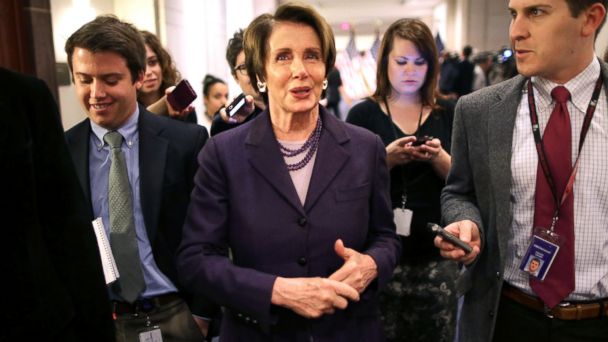Democrats: No Budget Deal Without Unemployment Insurance Extension

(Chip Somodevilla/Getty Images)
WASHINGTON, D.C. - The White House and its Democratic allies are pushing to continue a jobless benefits program set to expire for over a million long-term unemployed without congressional intervention. And while whispers persisted this week that Congress could be close to a budget deal before their holiday break, today Rep. Nancy Pelosi, D-Calif., said her party's negotiators were insistent on an extension as a bargaining chip.
"Yes, indeed, we are making a very clear statement that we cannot, cannot support a budget agreement that does not include unemployment insurance in the budget or as a sidebar in order to move it all along," she said at a Democrats-only hearing on the uninsured. "It would undermine who we are as a country."
The congresswoman later indicated at a press conference that she could support a budget deal that doesn't include continuation for the benefits, if they are extended separately on their own merit.
The measure, known as Emergency Unemployment Compensation (EUC), is designed to step in with federal insurance after a person's state benefits run out, usually after 26 weeks. It was enacted in 2008 by President Bush during the early stages of the economic recession; at the time unemployment hovered at 5.6 percent and jobless Americans could expect an average of five months searching for new employment. It has survived a number of renewals since.
Without traction on Capitol Hill it is likely 1.3 million will lose the insurance immediately after the program expires on Dec. 28, with an additional 3.6 million by the end of 2014, according to a report released today by the Labor Department and the White House Council of Economic Advisers.
"Despite ten consecutive quarters of GDP growth and 7.8 million private sector jobs added since early 2010, the unemployment rate is unacceptably high at 7.3 percent, and far too many families are still struggling to regain the foothold they had prior to the crisis," the report reads, adding it now takes an average nine months to find work.
The Obama administration argues failure to continue the program could lead to an additional 240,000 jobs cut in 2014, as job-seekers reduce their spending further to compensate for their thinner wallets. Citing estimates from the non-partisan Congressional Budget Office and JP Morgan, the report suggests it would negatively affect GDP by .2 to .4 percent.
Congressional Republicans have resisted an extension against a backdrop of ongoing budget negotiations. If a deal was close, the EUC's $25 billion price tag could worry some lawmakers over taking on the added cost. Similarly, $5 billion in expanded food stamps assistance was allowed to expire last week - a further indication of the climate surrounding the talks.
Responding to reporters today, House Speaker Boehner told press he didn't rule out an extension.
"If the president has a plan for extending unemployment benefits, I'd surely entertain taking a looking at it. But I would argue the president's real focus ought to be creating a better environment for our economy and creating more jobs for the American people," Boehner said. "That's where the focus is, not more government programs."
But on Tuesday one of the Republican negotiators working on a deal said he didn't see movement coming from his party.
"These have been extraordinary extensions, and the Republican position all along has been, we need to get back to normal here at some point," Rep. Tom Cole, R-Okla., said that day, responding to reporters' questions on the EUC.
"I don't see much appetite from our side for an extension of benefits. I just don't," he said.
Republicans have previously challenged the program by saying the federal benefits extend the recession by forcing employers to raise wages to retain workers. The White House report counters employees who voluntarily quit would be ineligible for the program, so it would not be an incentive.
Pelosi's hearing today was only for members of her caucus and featured some witnesses who stand to lose their only source of income. They included 67-year-old Stan Osnowitz, a journeyman and electrician with four decades experience suffering through the slow months of winter. His voice choked as he told the committee, "My work is who I am" and "I hate being unemployed. It's a waste of my time and my abilities."
Lisa Floyd, a sales and services professional, told the members that after a seven-month hiatus she had found work with a significantly reduced salary.
"I'm smart enough to know that most likely I would be changing careers and taking a pay cut," she said. "I applied for everything and anything. Eventually I began applying for entry-level call-center jobs. Jobs that would have resulted in a $30,000 a year paycut, or to put this another way: a 42 percent reduction in my pay."
She said the unemployment insurance program "kept me in my home" during the search.
"We strongly believe that if every member of Congress would take even a few minutes to speak personally with unemployed workers, there would not be any question at all about the need to extend the federal UI program," Rep. Sandy Levin, D-Mich., said at the hearing. "More than anything else they want a job, but finding work remains very difficult in an economy that still has 1.5 million fewer jobs than before the recession started six years ago."